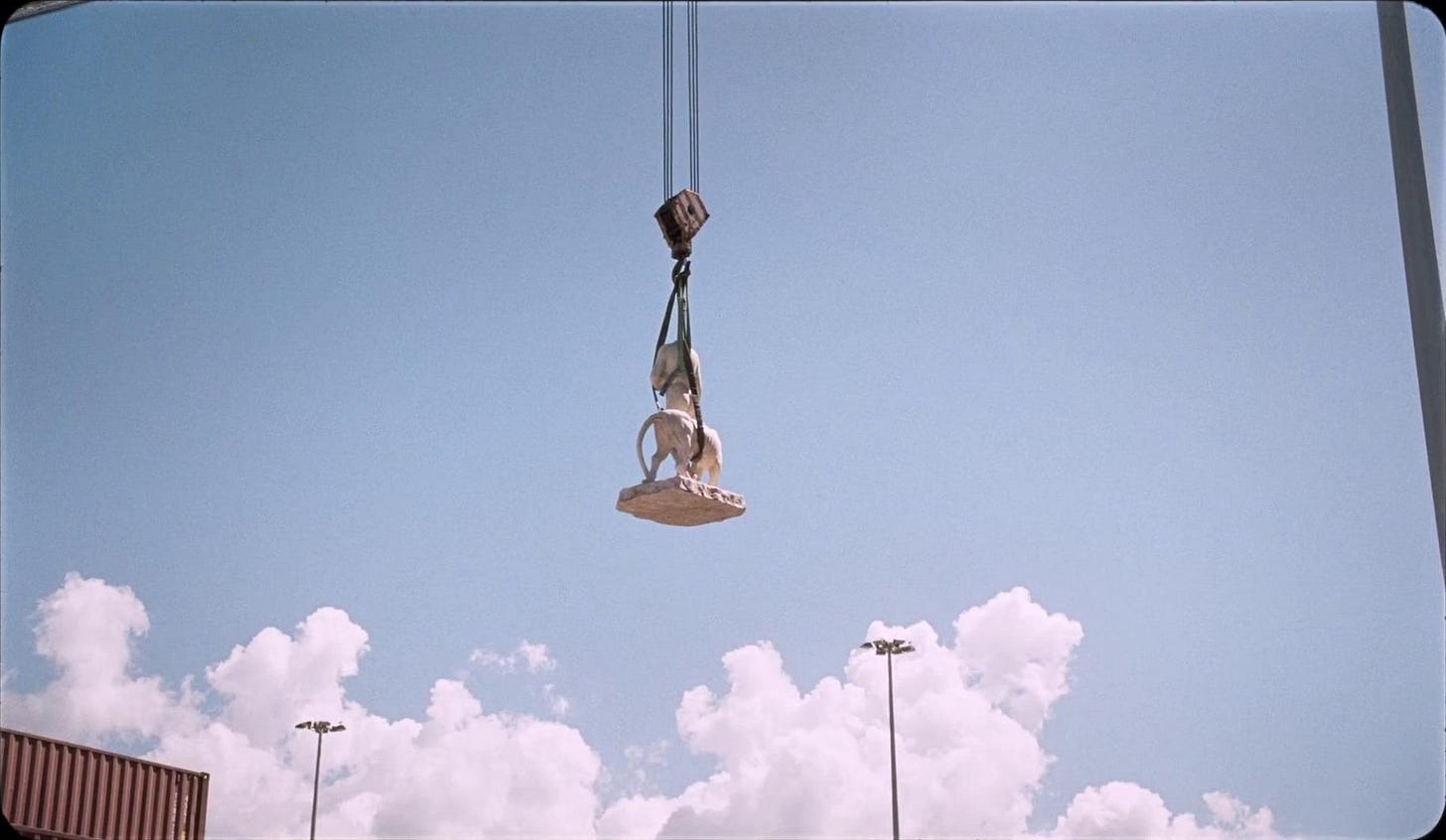La Chimera
dir. Alice Rohrwacher, 2023
Alice Rohrwacher’s follow-up to Happy as Lazzaro tells the story of Arthur (Josh O’Connor), a disheveled English ex-archaeologist/ academic in Tuscany who we meet on a train having just been released from prison for indiscretions of the past, i.e. grave robbing. He does this with a troupe of misfits, Tombaroli, who are local Tuscans who exploit Arthur’s unexplained supernatural ability for finding Etruscan tomb raiding sites. The hope is to sell the loot in the black market via a mysterious trader named Spartaco. La Chimera “The Impossible Dream” alludes to Arthur’s Orpheus like doomed journey in search of a way to connect with his dead lover, Beniemina, who is his last woman as he professes in a dreamy cold open. In a way, Beniemina permeates through the whole film and her ghostly presence is not even made known definitively until about halfway through the film. Beniemina’s mother Flora, played by Isabella Rossellini, seems to think that her daughter will come back any given day, and she finds kinship in Arthur as the only soul tethered to Beniemina for better or worse. The aptly named Italia (Carol Duarte) is Flora’s maid responsible for the upkeep of the dilapidated palazzo. Italia seems to be the only character that derails Arthur’s grieving by injecting some life into him; while the hope of romance is a bit out of reach for the man on a mission, he does seem to liven up around her. Flora spends her days giving Italia singing lessons despite calling her tone deaf. Italia manages to hide two children, who we are never explicitly told are hers, from Flora in that giant house.
This is just the surface premise of the film; the real star is Rohrwacher and her radiant world that is out of time and leaves an indelible impression. The film is set in the 80s but I did not know that while watching the film; it might as well have been set decades before or after and it wouldn’t have mattered. Rohrwacher excels in this sort of moody storytelling that at times doesn’t feel like it’s going in any particular direction, but by the end there is such mythical cohesion to the film that overtakes and overwhelms you. Rohrwacher gets to experiment and play here, and it is the rare case of an actor and a director being on the exact same wavelength. The film shapeshifts, as it moves seamlessly between the real world and the dream world (or memory); it also shifts between 35mm, Super 16mm and 16mm film stocks. Arthur himself speaks broken Italian, English, and inexplicably communicates in sign language to Italia when words just don’t suffice. Early on when Arthur goes to confront his gang about his missing items, the film takes on a silent film (Charlie Chaplin, Buster Keaton) tone as the footage is sped up for comedic effect; it does this just as you think you have settled into its whimsical rhythm. Having these many stylistic choices for good measure all in one film would be detrimental to a film, but Rohrwacher is so confident with her material and her star who is carrying this film like a proper 70s seasoned actor. A lot of people have made this comparison, but Elliott Gould in Altman’s The Long Goodbye is definitely a prototype for the type of rugged lead; there is even a shot that seems to be a direct nod to that film. O’Connor looks a mess from the first time we see him in his worn-out linen suit on the train back from prison; the other passengers are fascinated by him, and he will always be an outsider to this land, no matter how decent his Italian is. Rohrwacher and her cinematographer Hélène Louvart capture O’Connor and the setting so alluringly; there are also disorienting 180 degrees rotated shots throughout the film whenever Arthur is using his gift to find a site using his wooden rod. The rod reminded me of Tarkovsky’s The Stalker, and that character’s bolt that he constantly throws to navigate the mysterious zone.
The Long Goodbye / La Chimera
The back half delves into the grander commercialization of this line of work as we finally meet the foreboding baddie Spartaco, played by the always spectacular Alba Rohrwacher. The Tombaroli get hoodwinked by fake Polizia and the statue that they uncovered eventually ends up in Spartaco’s hands. We see these contraband artifacts ending up in a container cushioned by soccer balls. Arthur is tragically bound to the past, but he finally frees himself by throwing a missing piece of the statue into the ocean. “You’re not made for human eyes.” Italia disapproves of Arthur’s line of work and sees the whole operation as disturbing the spirits and an ethical transgression (including viewing the tomb art regardless of intention). Rohrwacher pulls off a stunning sleight of hand with Arthur as he seems to cross over to a spirit plane; in one haunting scene, we see the train passengers from earlier asking Arthur to find their lost belongings (think The Sixth Sense or The Discreet Charm of the Bourgeoise). There is a question of ownership as Isabella Rossellini’s tells Italia that the local abandoned train station belongs to everyone, and no one; Italia in the end makes it a home and others follow suit including the only woman from The Tombaroli. The film also posits that just as the Tombaroli ransack tombs without any regard or respect for the past, any evidence of our existence will also be easily discarded or traded centuries on. The film’s inevitable end is both tragic and hopeful, but Rohrwacher sets it up so beautifully that you are not analyzing anything by the end but rather reveling in her cinematic alchemy. It is one of the finest endings that I have seen in a long time.
Accompanying Song Recommendations:




